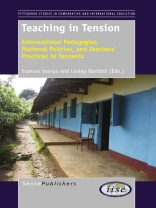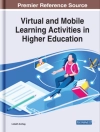In recent years, international efforts to improve educational quality in sub-Saharan Africa have focused on promoting learner-centered pedagogy. However, it has not fl ourished for cultural, economic, and political reasons that often go unrecognized by development organizations and policymakers. This edited volume draws on a long-term collaboration between African and American educational researchers in addressing critical questions regarding how teachers in one African country—Tanzania—conceptualize learner-centered pedagogy and struggle to implement it under challenging material conditions. One chapter considers how international support for learner-centered pedagogy has infl uenced national policies. Subsequent chapters utilize qualitative data from classroom observations, interviews, and focus group discussions across six Tanzanian secondary schools to examine how such policies shape local practices of professional development, inclusion, gender, and classroom discourse. In addition, the volume presents an analysis of the benefi ts and challenges of international research between Tanzanian and U.S. scholars, illuminating the complexity of collaboration as it simultaneously presents the outcome of joint research on teachers’ beliefs and practices. The chapters conclude with questions for discussion that can be used in courses on international development, social policy, and teacher education. “This volume, written by a multi-national team of scholar-practitioners, makes an important contribution to our understanding of learner-centered teaching and collaborative educational research. Based on an intensive investigation in Tanzania of a professional development program and teachers’ efforts to conceptualize and implement a globally-promoted pedagogical approach, the authors illustrate – and critically analyze – how these practices are enabled and constrained by cultural lenses, power relations, and material conditions. Importantly, they alsoexamine refl exively how cultural, power, and resource issues shaped their struggle to engage in a collective praxis of qualitative inquiry. The tensions referenced in the title sparked valuable insights, which will be useful to educators, researchers, and policy makers.” — Mark Ginsburg, FHI 360 and Teachers College, Columbia University.
Содержание
Acknowledgements; List of Tables; List of Abbreviations and Acronyms; Series Editors Introduction; 1: Introduction; 2: The Emergence of an International Teacher Education and Research Collaboration; 3: Learning to Teach in Tanzania: Teacher Perceptions and Experiences; 4: Teachers’ Understandings and Implementation of Learner-Centered Pedagogy; 5: Working Lives of Teachers: Social and Material Constraints; 6: Testing and Teaching: The Tanzanian National Exams and Their; Influence on Pedagogy; 7: Teachers’ Conceptualizations and Practices of Inclusion; 8: Gendered Aspects of Classroom Practice; 9: Classroom Discourse; 10: International Collaboration: Processes, Benefits, Tensions, and Conclusions; Notes on Contributors; Index.












